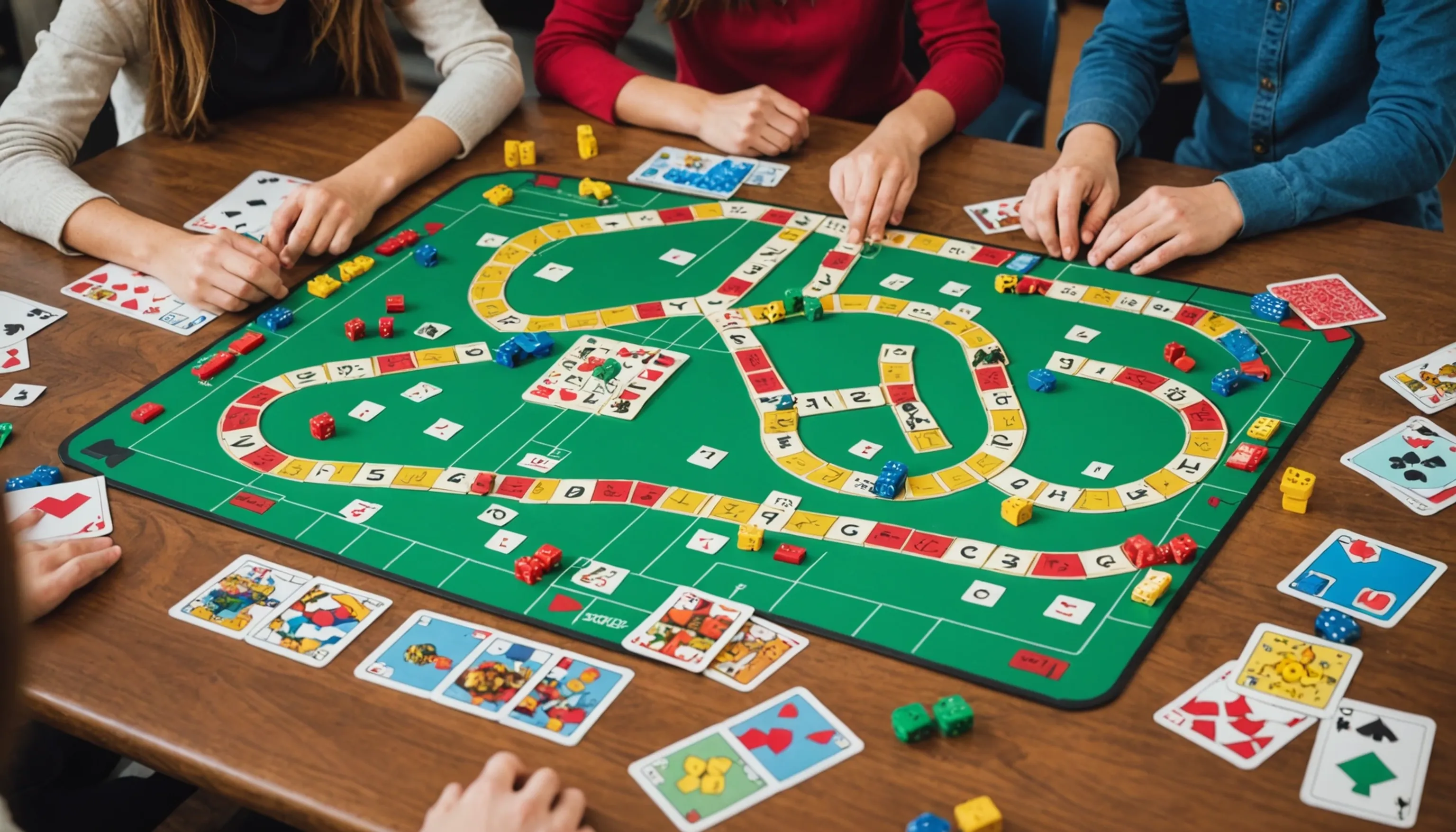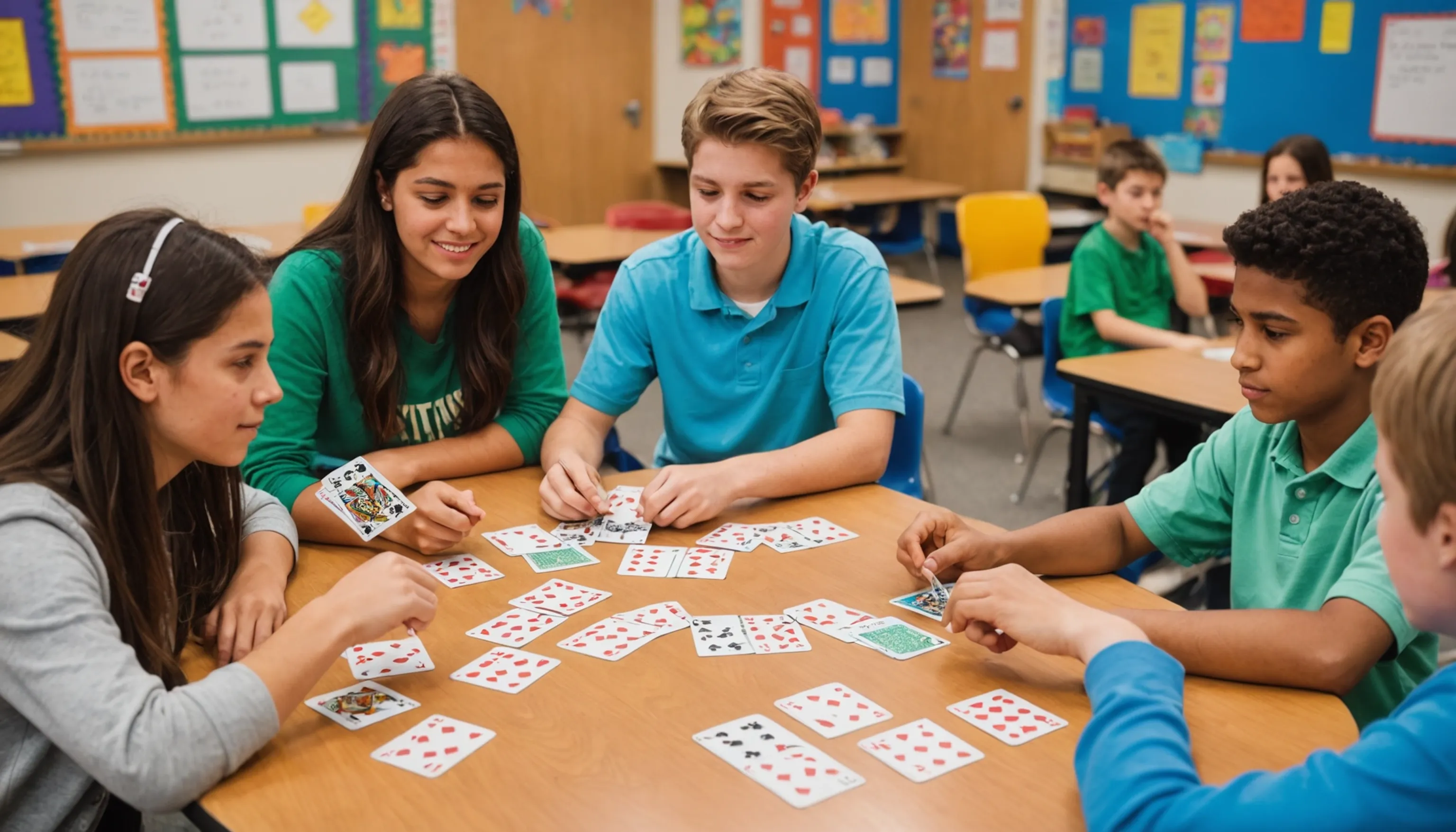Best Practices for Teaching Math Through Games
 HvWHenry van Wagenberg
HvWHenry van Wagenberg
Best Practices for Teaching Math Through Games
Teaching math through games is a highly effective approach that can enhance engagement and learning. Here are some best practices for implementing this strategy:
- Integrate games into lessons: Use games that align with the curriculum to reinforce concepts.
- Encourage collaboration: Promote teamwork through group games to foster communication and problem-solving.
- Balance fun & learning: Ensure the games are enjoyable while focusing on specific math skills.
- Assess progress: Use games as a tool to evaluate understanding and identify areas for improvement.
Why Use Games to Teach Math?
Using games to teach math is not just about making learning fun; it's about enhancing understanding and retention of mathematical concepts. Games provide an interactive environment that encourages students to explore and apply math skills in a low-pressure setting. Here are several reasons why integrating games into math instruction is beneficial:
- Increased Engagement:Games capture students' attention and motivate them to participate actively. When students are engaged, they are more likely to absorb the material.
- Real-World Applications: Many math games simulate real-life scenarios, allowing students to see the relevance of math in everyday situations. This practical approach helps them understand the importance of what they’re learning.
- Development of Critical Thinking: Games often require strategic thinking and problem-solving, which can enhance a student’s analytical skills. As they navigate challenges, they learn to think critically and make decisions based on mathematical reasoning.
- Peer Learning: Playing games in groups fosters collaboration and communication among students. They can learn from each other, share strategies, and develop social skills while reinforcing their math knowledge.
- Immediate Feedback: Games often provide instant feedback, helping students recognize their strengths and areas needing improvement. This immediate reinforcement encourages a growth mindset.
In summary, incorporating games into math teaching not only makes learning enjoyable but also cultivates essential skills that contribute to students' overall academic success.
Benefits of Game-Based Learning in Math
Game-based learning in math offers numerous benefits that can significantly enhance students' understanding and retention of mathematical concepts. Here are some key advantages of utilizing games in math education:
- Enhanced Engagement: Games are inherently interactive and enjoyable, capturing students' interest. This engagement leads to increased motivation to learn, making students more willing to tackle challenging math topics.
- Improved Retention: When students learn through games, they are more likely to remember the concepts. The fun and competitive elements create memorable experiences that reinforce learning.
- Development of Critical Thinking Skills: Many math games encourage strategic thinking and problem-solving. Students must analyze situations, make decisions, and adapt strategies, which fosters critical thinking skills that are essential in mathematics.
- Opportunities for Collaboration: Game-based learning often involves teamwork and collaboration. Working with peers allows students to share ideas, communicate effectively, and learn from each other, promoting a deeper understanding of mathematical concepts.
- Instant Feedback: Games provide immediate feedback on performance, helping students identify their strengths and weaknesses. This instant reinforcement allows them to adjust their strategies and improve their understanding in real-time.
- Customization and Differentiation: Teachers can tailor math games to meet the varying skill levels of their students, ensuring that each child is adequately challenged while still being able to succeed.
Overall, game-based learning in math not only makes the subject more enjoyable but also equips students with essential skills that extend beyond the classroom.

Types of Math Games to Consider
When incorporating games into math education, there are various types to consider that cater to different skills and learning styles:
- Board Games: Classic games like Monopoly or Ticket to Ride enhance strategic thinking and basic math skills.
- Online Games: Websites and apps like Prodigy and Khan Academy offer interactive math challenges that adapt to student levels.
- Card Games: Games like Uno or Math War can reinforce addition, subtraction, and multiplication concepts.
- Puzzles: Sudoku and logic puzzles develop critical thinking and problem-solving abilities.
Board Games That Enhance Math Skills
Board games are a fantastic way to enhance math skills while providing a fun and engaging learning experience. Here are some popular board games that effectively promote various mathematical concepts:
- Monopoly: This classic game encourages players to manage money, make calculations for property purchases, and understand concepts like profit and loss. It fosters strategic thinking and financial literacy.
- Life: Players navigate through life decisions while managing resources, which helps them practice addition and subtraction through budgeting and financial planning.
- Sum Swamp: Aimed at younger students, this game reinforces addition and subtraction skills in a fun, interactive way as players move through a swamp.
- Prime Climb: This colorful game teaches players about prime numbers and mathematical operations through movement on a spiral board, making math concepts accessible and enjoyable.
- Qwirkle: Players match colors and shapes, which involves strategic thinking and basic math skills such as counting and pattern recognition.
- Blokus: Although not strictly a math game, it enhances spatial reasoning and geometry skills as players fit their pieces onto the board.
Incorporating these board games into math instruction not only makes learning enjoyable but also allows students to practice essential skills in a collaborative setting. By playing these games, students can develop a positive attitude towards math while improving their critical thinking and problem-solving abilities.
Online Math Games for Teens
Online math games are an excellent resource for teens, providing a dynamic and interactive way to reinforce math concepts while keeping students engaged. Here are several popular online math games that cater to teenagers:
- Prodigy Math: This role-playing game allows students to embark on quests while solving math problems aligned with their curriculum. Prodigy adapts to the player's skill level, ensuring a personalized learning experience.
- Khan Academy: Though not a traditional game, Khan Academy offers interactive exercises and challenges across various math topics. The platform provides instant feedback and progress tracking, making it a valuable tool for self-paced learning.
- Math Playground: This site features a variety of math games, puzzles, and logic challenges that encourage critical thinking and problem-solving skills. Games are categorized by grade level, making it easy for teens to find suitable content.
- Coolmath Games: A collection of fun and engaging games that focus on logic, strategy, and number skills. Teens can enjoy games like “Bloxorz” and “Run” while enhancing their mathematical thinking.
- Sumdog: This platform combines gaming with math practice, allowing students to compete with peers while reinforcing essential math skills. It adapts to each student's level, providing tailored challenges.
By incorporating these online math games into their study routine, teens can develop their math skills in an enjoyable and stress-free environment, fostering a positive attitude towards learning.

Card Games to Teach Math Concepts
Card games are an effective and enjoyable way to teach math concepts to students of all ages. Here are a few card games that can enhance mathematical understanding:
- Math War: A fun variation of the classic War game where players flip cards and perform calculations to determine the winner.
- Uno: Players practice addition and color recognition while keeping score, which reinforces basic math skills.
- Set: This game helps develop critical thinking and pattern recognition by challenging players to find sets of cards based on specific attributes.
Creating Your Own Math Games
Creating your own math games can be a rewarding and fun way to reinforce mathematical concepts while catering to the specific needs and interests of your students. Here’s a step-by-step guide to help you design engaging and educational math games:
- Identify Learning Objectives: Start by determining which math skills or concepts you want to reinforce. This could include addition, subtraction, multiplication, fractions, or geometry.
- Select a Game Format: Choose a game format that fits your objectives. Consider board games, card games, or even digital formats. Think about how students will interact with the game.
- Develop Rules: Create clear and simple rules that are easy to follow. Ensure that the rules encourage mathematical thinking and problem-solving while keeping the game competitive and enjoyable.
- Incorporate Challenges: Add challenges or levels to the game to cater to different skill levels. This ensures that all students can participate and learn at their own pace.
- Test the Game: Before introducing the game to your students, playtest it yourself or with colleagues to identify any potential issues or areas for improvement.
- Gather Feedback: After your students play the game, collect their feedback. Ask them what they enjoyed and what could be improved. This information is invaluable for refining the game.
By creating your own math games, you can tailor the learning experience to your students, making math both fun and relevant.
Incorporating Math Games into Daily Activities
Incorporating math games into daily activities can seamlessly enhance students' mathematical skills without the need for structured lessons. Here are several effective strategies to integrate math games into everyday life:
- Family Game Nights: Designate a regular family game night where you play math-focused games like Monopoly or Uno. This not only strengthens family bonds but also reinforces math skills in a fun setting.
- Cooking and Baking: Involve students in cooking or baking activities that require measuring ingredients. Use this opportunity to teach fractions, conversions, and even basic multiplication and division.
- Shopping Activities: While grocery shopping, ask students to help calculate the total cost, compare prices, or determine discounts. This real-life application of math makes learning relevant and practical.
- Travel Games: During road trips, engage students with math-related games like counting specific objects, solving riddles, or playing “I Spy” with numbers. These activities can make long journeys educational and entertaining.
- Outdoor Games: Create outdoor scavenger hunts that involve solving math problems to find the next clue. This encourages physical activity while reinforcing math concepts in an engaging way.
By integrating math games into daily activities, you create an environment where learning occurs naturally and consistently. This approach not only enhances math skills but also fosters a positive attitude towards mathematics in students.
Tips for Engaging Teenagers in Math Games
Engaging teenagers in math games can be challenging but rewarding. Here are some effective tips to keep them interested:
- Choose Relevant Games: Select games that relate to their interests, such as sports-themed math games or those based on popular culture.
- Incorporate Technology: Use online platforms and apps that offer interactive math games, appealing to their tech-savvy nature.
- Encourage Competition: Introduce friendly competitions with rewards to motivate participation and create excitement.
- Foster Collaboration: Encourage teamwork through group games, allowing them to learn from each other while building social skills.
Setting Up a Game Night for Math Learning
Setting up a game night focused on math learning can be a fun and educational way to engage students while reinforcing important concepts. Here’s how to organize an effective game night:
- Choose a Date and Time: Select a date and time that works for most participants. Consider weekends or evenings when students are more likely to be available.
- Select Math Games: Curate a list of math games that cater to different skill levels and interests. Include a mix of board games, card games, and online games to keep the options diverse and exciting.
- Create a Comfortable Environment: Set up a comfortable space with enough seating and tables for everyone. Ensure good lighting and minimize distractions to help everyone focus on the games.
- Prepare Materials: Gather all necessary materials in advance, including game pieces, cards, and any additional supplies needed for specific games. If using online games, ensure that devices are charged and ready to go.
- Incorporate Snacks: Provide snacks and drinks to create a relaxed atmosphere. Healthy options can keep energy levels up, while treats can make the event more enjoyable.
- Encourage Interaction: As the host, facilitate interaction among participants. Encourage them to discuss strategies, share tips, and collaborate while playing.
By setting up a game night for math learning, you create an engaging environment where students can strengthen their math skills, build relationships, and have a great time together.
Encouraging Healthy Competition Through Games
Encouraging healthy competition through games can be an effective way to engage students while reinforcing math skills. Here are some strategies to promote a positive competitive spirit during math games:
- Set Clear Rules: Establish clear and fair rules before starting the game. This ensures everyone understands what is expected and creates a level playing field.
- Emphasize Learning Over Winning: Encourage students to focus on improving their math skills rather than just winning. Highlight the importance of learning from mistakes and celebrating progress.
- Introduce Team-Based Challenges: Divide participants into teams to foster collaboration and camaraderie. Team challenges can help students support one another while working towards a common goal.
- Offer Incentives: Provide small rewards or recognition for achievements, such as certificates or fun prizes for participation, improvement, or teamwork. This can motivate students to give their best effort.
- Encourage Sportsmanship: Teach students the value of good sportsmanship by promoting respect and encouragement among peers. Remind them to congratulate others on their successes and to learn from their own experiences.
- Share Success Stories: At the end of the game, take time to discuss what each participant learned. Sharing strategies and insights fosters a sense of community and encourages continuous improvement.
By implementing these strategies, you can create an environment where competition is healthy and constructive, ultimately enhancing students' math skills while making learning enjoyable.
